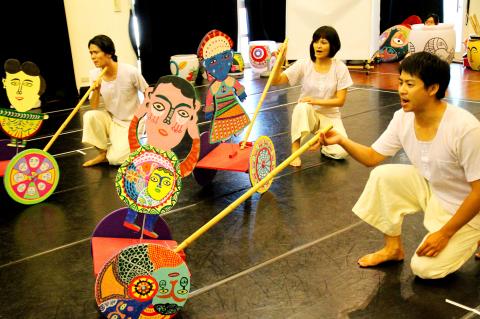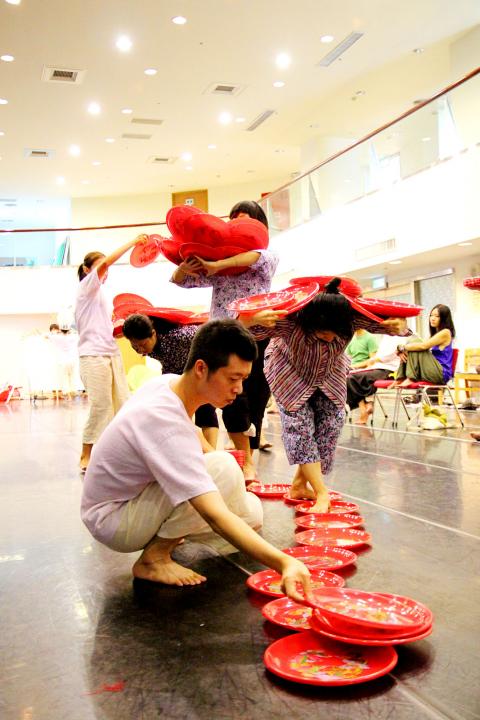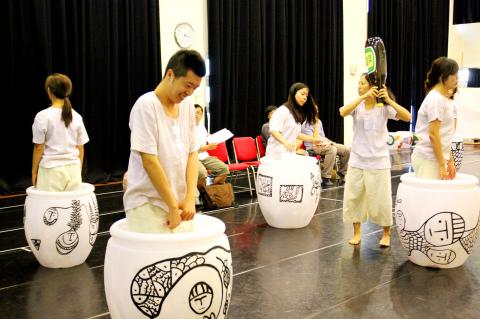The life of artist Hung Tung (洪通) is the stuff of legend. Orphaned at the age of four, he was illiterate and spent most of his life earning a meager living by working odd jobs. He started to paint at 50, was quickly discovered by the media, and rocketed to fame in the 1970s. Some hailed him as a genius; others said he was a lunatic. Forty years later, many people don’t even know his name.
The Puppet & Its Double Theater (無獨有偶工作室劇團) is reviving the eccentric painter’s story with Who’s Hung Tung (洪通計劃), a theatrical production commissioned by the Taipei Arts Festival (台北藝術節) that pays tribute to Hung and renowned musician Lee Tai-hsiang (李泰祥).
To learn about the artist firsthand, actors, theater designers and other members of the troupe visited Hung’s old home in today’s Kunjiang Village (鯤江村), Greater Tainan, to conduct research and interview his relatives, friends and neighbors. Company director Cheng Chia-yin (鄭嘉音) says that what they learned about Hung didn’t set the story straight.

Photo courtesy of The Puppet & Its Double Theater
Some say the artist once worked at Taoist temples as a spirit medium, or dangki as they are known in Hoklo (commonly known as Taiwanese), and was possessed by deities when he painted. Others claim Hung used his own penis as a painting tool. The painter was often spotted practicing the monkey fist (猴拳), a martial arts move, or singing Taiwanese operas in the middle of crop fields, but he was mostly perceived as a loner who escaped fame by locking himself in his hut. He died in 1987.
“Different people say different things, so we find it very difficult to present Hung with a single, linear story,” Cheng told the Taipei Times. “We chose to approach him from various angles and incorporate multiple perspectives.”
As a result, Who’s Hung Tung is more of a creative search for the artist than a straight biography. Composed of 15 segments, the 80-minute performance contains recurrent themes, images and characters such as Bird-Man, who Cheng says was inspired by Hung’s wish to become a bird. There are sections that depict anecdotes about the painter or revisit different opinions about his folk-themed work. The strange creatures, human heads, and fauna and flora on Hung’s rich canvases are transferred to the stage as puppets, figures and masks that the performers use to convey their reflections on the painter and his art.

Photo courtesy of The Puppet & Its Double Theater
The vignette-like structure also reflects the way the work was collectively developed by all of the participating artists, Cheng says. For example, the actors spent days playing with objects and materials to explore their potential as props. Items commonly found at temple fairs, such as bamboo and offering plates, feature prominently because Taoist mysticism is believed to have had a strong influence on Hung’s aesthetic vocabulary.
“We visited the temple near Hung’s old home,” Cheng says. “When Taoist rituals take place it fills with incense smoke and the deafening sound of gongs and drums. It’s a lot like his paintings, which overflow with excessiveness and abundance.”
The production is in Mandarin and Hoklo, with English programs available at the door.

Photo courtesy of The Puppet & Its Double Theater
Comments:
Letter to the editor:
Your story today about artist Hung Tung said that he started to paint at the age of 50 and was "quickly discovered by the media and rocketed to fame in the 1970s." As I recall it, he labored in obscurity for some time and only came to media attention after the U.S. Information Service gave him a one-man show. Many in the art establishment were shocked that such a primitive artist (he was often compared to "Grandma Moses" in the U.S.) could receive such recognition. After gaining fame, the eccentric Hung agreed only reluctantly to offer any of his works for sale.
Don Shapiro

Google unveiled an artificial intelligence tool Wednesday that its scientists said would help unravel the mysteries of the human genome — and could one day lead to new treatments for diseases. The deep learning model AlphaGenome was hailed by outside researchers as a “breakthrough” that would let scientists study and even simulate the roots of difficult-to-treat genetic diseases. While the first complete map of the human genome in 2003 “gave us the book of life, reading it remained a challenge,” Pushmeet Kohli, vice president of research at Google DeepMind, told journalists. “We have the text,” he said, which is a sequence of

On a harsh winter afternoon last month, 2,000 protesters marched and chanted slogans such as “CCP out” and “Korea for Koreans” in Seoul’s popular Gangnam District. Participants — mostly students — wore caps printed with the Chinese characters for “exterminate communism” (滅共) and held banners reading “Heaven will destroy the Chinese Communist Party” (天滅中共). During the march, Park Jun-young, the leader of the protest organizer “Free University,” a conservative youth movement, who was on a hunger strike, collapsed after delivering a speech in sub-zero temperatures and was later hospitalized. Several protesters shaved their heads at the end of the demonstration. A

In August of 1949 American journalist Darrell Berrigan toured occupied Formosa and on Aug. 13 published “Should We Grab Formosa?” in the Saturday Evening Post. Berrigan, cataloguing the numerous horrors of corruption and looting the occupying Republic of China (ROC) was inflicting on the locals, advocated outright annexation of Taiwan by the US. He contended the islanders would welcome that. Berrigan also observed that the islanders were planning another revolt, and wrote of their “island nationalism.” The US position on Taiwan was well known there, and islanders, he said, had told him of US official statements that Taiwan had not

We have reached the point where, on any given day, it has become shocking if nothing shocking is happening in the news. This is especially true of Taiwan, which is in the crosshairs of the Chinese Communist Party (CCP), uniquely vulnerable to events happening in the US and Japan and where domestic politics has turned toxic and self-destructive. There are big forces at play far beyond our ability to control them. Feelings of helplessness are no joke and can lead to serious health issues. It should come as no surprise that a Strategic Market Research report is predicting a Compound